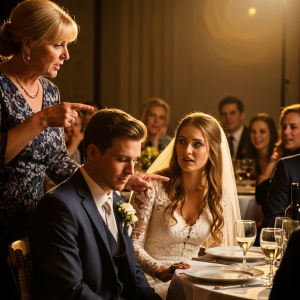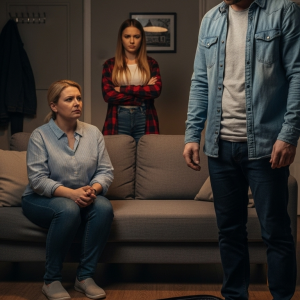My ex-wife, Angela, and I met in our mid-20s. We married after two years and soon had our first daughter. Those early years were happy. But everything changed with the second pregnancy. It was unplanned, and though I told her it was okay if she didn’t want to go through with it, she chose to keep the baby. From that point on, she became a different person—moody, irritable, and distant. I told myself it was hormones, that the woman I loved would eventually return. She never did.
Angela had quit her job to be a stay-at-home mom, but after our second daughter was born, she refused to do anything. While I juggled deadlines and client calls, she would spend her days lost in the flickering glow of reality television, ignoring the housework and even our children. We had to hire a housekeeper, a strain on our budget that I reluctantly accepted because I didn’t want to pressure her.
After six months of this, I knew we couldn’t continue. I arranged for my parents to watch the girls and sat Angela down. I calmly explained that we couldn’t afford the housekeeper anymore and that I needed her to be my partner again.
The conversation turned explosive. She refused, accusing me of being a failure for not earning more. “I’m done being pushed around by you,” she shrieked, “forced to do all the work while you do nothing except sit at a desk all day!” The absurdity of her statement was staggering.
The fight escalated until I said something I regret, but was true. “You have already failed at being a good mother, and now you are failing as a wife.”
That remark broke something in her. She shoved me with all her might. I lost my balance and fell back onto our glass coffee table, shattering it. Luckily, my injuries were superficial, but my trust was completely broken. I told her she had to move out; I couldn’t trust her around our children anymore.
She begged me not to divorce her. We agreed she would live with her parents and undergo therapy. I didn’t want my daughters to grow up without a mother, so I gave our marriage one last shot. For almost a year, things seemed to improve. We attended marriage counseling, and her therapist told me her postpartum depression and anger issues were getting better. I started to have hope.
Then, she vanished. She stopped attending counseling and stopped responding to my calls. After three months of silence, I drove to her parents’ house. They slammed the door in my face. A cold dread began to pool in my stomach. I walked around to the backyard, and there she was. Angela was on the garden swing, her back to me, passionately kissing a man I didn’t recognize.
The world stopped. By the time she turned and saw me, I was already walking back to my car, a robot moving through a nightmare. I blocked her number and immediately told my parents to find me a divorce lawyer.
The divorce was brutal. She had given up her rights to our children to be with her new man, Shawn, yet she still fought for alimony. We fought back, and in the end, she walked away with nothing.
Five years passed. Life, for me and my daughters, became good. I got a better-paying job, we moved into a bigger house, and my parents lived nearby, helping out often. My daughters were happy. That’s all a man needs. I was thankful.
Then, a few days ago, the ghost of my past showed up at my door.
I was about to leave for work when the doorbell rang. It was Angela. Standing beside her was a small boy, no older than four. I knew instantly he had to be her son with Shawn.
She started crying as soon as I opened the door. “I’m here to apologize,” she wept. “I’m ready to be a family again. To give our marriage another chance.”
The sheer audacity of her words struck me dumb. She stood there, with another man’s child, acting as if she held the power to simply restart our lives. In that split second, any lingering shadow of the man who once loved her died.
“This is not your family anymore,” I said, my voice cold and steady. “You stopped being my wife the day you chose him. You gave up your right to be their mother the day you signed those papers. You have no right to be here.”
Before she could respond, I slammed the door in her face. I could hear her wailing outside for a few minutes, but I ignored it. I waited until the coast was clear, then went to work, trying desperately to erase the encounter from my mind.
I failed. That evening, I received a call from my parents. They were furious.
“Why did you turn her away, son?” my father demanded.
They told me everything. Angela had contacted them a month ago. Her relationship with Shawn was over. It was my parents who had given her my new address. It was my parents who had encouraged her to show up.
“Your daughters need a mother, Mark,” my mother said, her voice filled with a maddeningly misplaced righteousness. “And there is no better mother than Angela. We decided she deserved another chance.”
“You decided?” I was incredulous. “It wasn’t your place to forgive her! It wasn’t your place to let her back into our lives!”
They wouldn’t listen. They claimed that because they had helped me during the divorce, they had an equal right to decide what was best for my children. They accused me of being selfish and arrogant. We got into a massive fight, and I hung up, my mind reeling from their betrayal. But I had no idea how deep that betrayal truly went.
A few days after our fight, my parents sent me an email, believing it would make me understand. All it did was unravel a five-year conspiracy that left me breathless.
Apparently, they had never cut Angela out of their lives. They had been in touch with her all along.
The truth was horrifyingly simple. After Shawn had forced Angela to sign away her parental rights, she had gone to my parents in secret. She begged them to act as a bridge, to let her see her daughters without my knowledge. And my parents, believing they were acting in the children’s “best interests,” agreed.
For five years, they had been lying to me. Whenever I dropped my daughters off at their house for the weekend, they would invite Angela over. My children never told me. They were bribed with toys and candy to keep the secret. When I would ask my daughters what they did, they would say they “played games with grandparents and their friend.” That “friend” was their mother.
I confronted my daughters. They burst into tears, confessing that they were told “God would punish them” if they ever told me the truth. My parents and Angela had manipulated my own children into a conspiracy of silence against me.
It wasn’t just a betrayal; it was the erasure of my reality for the past five years. The foundation of trust I had with my own parents had crumbled into dust.
The email from my parents also revealed why Angela had returned. Shawn had received a job offer in another city and wanted to move. He was done being a “family man.” He was leaving her and their son. So, Angela, her new life in ruins, decided to simply reclaim her old one. Her return wasn’t about love or remorse; it was about convenience.
Justice, in a bitter way, had been served.
I have spoken to my lawyer. A petition for restraining orders against all three of them—Angela, my mother, and my father—has been filed. My daughters and I have started family counseling to unpack the years of deception. I have told them, gently, that they will not be seeing their mother or their grandparents again for a very long time.
This all ends now. My only job is to protect my children and rebuild our lives on a foundation of truth, a foundation I will have to build by myself.
The day after I filed the restraining orders, the phone calls started.
Unknown numbers. Numbers I recognized but had blocked. Even private numbers that I knew belonged to my parents.
I didn’t answer a single one.
By the third day, they switched to email. My father wrote that I was “overreacting” and “turning the girls against family.” My mother claimed I was “poisoning” them by keeping them away from their “real mother.” They used every manipulative trick they’d honed over decades — guilt, religion, shame — but I deleted every message without reading past the first line.
It wasn’t strength that kept me from replying. It was knowing that if I engaged, they’d twist my words into weapons. I wasn’t going to give them ammunition.
In our second counseling session, the therapist asked my daughters to draw pictures of their family.
My youngest, Emily, drew me, her sister, and herself holding hands in the middle of a sunny park. My oldest, Claire, drew something different: me on one side of a big, jagged crack, and Angela on the other. Between us, she’d scribbled “NANA” and “PAPA” in shaky block letters.
When the therapist gently asked her why she drew it that way, Claire said, “Because Nana and Papa made us walk across to Mommy, but it felt like a trap.”
I nearly broke down right there. All those weekends I thought they were safe, happy, and carefree at my parents’ house — they were being dragged into a double life, taught to lie, taught to choose between parents. That’s not family. That’s emotional abuse.
One week after being served the restraining order, Angela broke it.
She showed up at my work. My receptionist called me, panicked, because there was a woman with a little boy demanding to see me. I walked to the lobby, not to engage — just to make sure she saw I was not afraid.
She tried tears again. “Mark, I made a mistake. I just want my girls to know their brother.”
I didn’t raise my voice. I didn’t take the bait. I pointed at the door and said, “You have ten seconds to leave before I call security and the police. You are not welcome here, and neither is your story.”
She left, muttering about how I was “cruel” and “heartless.” I didn’t care. In her mind, cruelty was simply me not letting her bulldoze the boundaries she had already destroyed years ago.
I didn’t just block my parents’ calls — I cut off their access to everything.
Bank accounts they had joint signatures on? Closed.
Keys to my house? Locks changed.
Family photos where they appeared? Packed away in a box in the attic.
It wasn’t about erasing history. It was about controlling the present.
The lawyer warned me it might escalate — that people like my parents, who think they have “rights” to my kids, often try to push back legally. But because Angela signed away her parental rights years ago, and my parents had no legal standing, their power was gone.
The first weekend without seeing my parents, Emily asked if we could “do something special” instead. So we made pancakes in the shape of animals, got flour all over the kitchen, and then watched movies in a blanket fort until bedtime.
Claire, at first more withdrawn, eventually opened up. “It’s weird not going there,” she admitted. “But I like not having to lie anymore.”
That was the moment I knew I was on the right path. The absence of deceit is a kind of peace kids notice instantly.
Without my parents in the picture, I worried about losing a safety net. But that net was replaced almost overnight by people who truly cared. My neighbors started inviting us over for weekend barbecues. A couple of my old college friends offered to help with babysitting.
One friend, Sarah, who had been through her own messy divorce, said something that stuck with me:
“You didn’t just protect your daughters from Angela. You showed them that love has boundaries — and that those boundaries are worth defending.”
One night, after the girls were asleep, I sat down and wrote a letter to my parents.
I told them exactly how their betrayal felt — not as a son, but as a father. I told them that every time they let Angela into my daughters’ lives, they were telling them that my rules, my love, and my protection meant nothing.
And then I wrote the last line:
“You didn’t just lose your relationship with me. You lost the right to call yourselves grandparents.”
I folded it, put it in an envelope, and tucked it into my desk. I’ll never send it. Like the letter I once wrote to Angela during the divorce, it wasn’t for them. It was for me.
It’s been three months since I cut them all out. The house is quieter, calmer. There’s no undercurrent of anxiety, no wondering what my kids might be told behind my back.
The girls have started talking about the future — school trips, sports teams, even maybe adopting a dog. I’m considering it. A dog doesn’t lie to you.
I’m also looking into moving to a different neighborhood, partly for a fresh start, partly so there’s no chance of “accidental” run-ins.
Here’s the truth I didn’t want to admit for years: sometimes, blood family will harm you more deeply than any stranger ever could. And sometimes, protecting your kids means protecting them from people who share your last name.
My parents will tell themselves they acted out of love. Angela will probably paint herself as the tragic mother kept from her children by a bitter ex-husband. But I know the truth. And more importantly — my daughters now know it too.
They’ve seen that I will stand up for them, even against the people who raised me. That I will take the hits, endure the accusations, and face down anyone who threatens their safety.
That’s the kind of family I want us to be — not one bound by obligation or tradition, but by trust, respect, and choice.
I used to think closure meant getting an apology. But closure, I’ve learned, is walking away without needing one.
I won’t be answering their calls. I won’t be reading their emails. I won’t be telling my daughters “Maybe one day.” That “one day” doesn’t exist anymore.
Angela is gone. My parents are gone. And for the first time in years, I’m okay with that.
Because what I have now — just me and my girls — is more than enough. And I’ll defend it with everything I’ve got.




